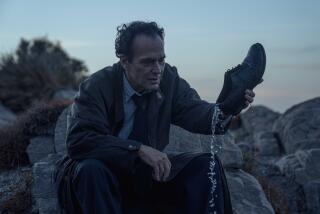Movie review: ‘The Eye of the Storm’ centers on a bleak house of woe
With impeccable source material and a talented creative team”ENMV0002398”>”ENMV0002398”>, “The Eye of the Storm”is an ambitious stab at what might be called the Great Australian Film. The results are off-and-on impressive, but the project’s ambitions turn out to be greater than its ability to achieve them.
“Eye of the Storm” is based on a massive, 600-plus page novel by the celebrated Australian writer Patrick White, who won the Nobel Prize in Literature in 1973, the same year this savage tale of the psychological horrors family members inflict on one another was published.
Shepherding the task of bringing the book to the screen is the veteran director Fred Schepisi, whose “The Chant of Jimmie Blacksmith” was a key film in the Australian film renaissance of the 1970s. His screenwriter of choice is Judy Morris, whose credits include the very different “Happy Feet” and “Babe, Pig in the City” working with another standout Australian director, George Miller.
As for the actors, with Geoffrey Rush, Charlotte Rampling and Judy Davis in the starring roles and able support from gifted veterans across the board, the cast really couldn’t be improved on.
Yet despite all these good things, watching “Eye of the Storm” feels more like an obligation than a pleasure more often than it should. That’s largely due to the story it tells and the characters it portrays.
If “Eye of the Storm” has a theme, it’s the family as all-devouring monster, in this case a de facto unit whose aggrieved and self-absorbed members have decades of resentments, bitter disappointments and grudges among them. The Von Trapps of “The Sound of Music” this is not.
The year is 1973, and Elizabeth Hunter (Rampling), one of the wealthiest grand dames of Sydney society, is not quite dead but close enough to have both her estranged adult children pay a visit from Europe. It’s not really emotion that brings them home as much as a fear that something might get in the way of their much-anticipated inheritance.
Son Basil (Rush) is an actor and playwright always in need of funds even though he’s so celebrated in England he’s been knighted. Like his mother he’s a great dissembler — “never deceitful but often devious” in her words — and he considers a visit home to be a major performance.
Daughter Dorothy (Davis) is if anything in worse shape. The marriage that made her the French Princess de Lascabanes is long since over, and a lifelong competition with her mother has left her a needy emotional ruin who is penniless into the bargain.
The impossible Elizabeth, who was the major player in creating these sibling wrecks, may be old and infirm, given to drug-addled “morphine moments,” but (beautifully played by Rampling, who was aged 15 years for the part), she is still the ultimate manipulator and seductress, capable of leaving destruction and devastation in her wake without half trying. She and her children take periodic stabs at being human, but these are fated not to last.
Holding Elizabeth together as much as possible is her household staff, which presents a psychodrama all its own. Key members are housekeeper Lotte (Helen Morse), an aged Holocaust survivor who periodically entertains her employer with ancient Weimar cabaret routines, and Flora (expertly played by Alexandra Schepisi, the director’s daughter), a live wire nurse who always has an eye out for the main chance.
As befits a film with an illustrious pedigree, “The Eye of the Storm” does grapple in its own way with serious themes of family, rage and forgiveness, and what matters in life. With a cast this good, there are bound to be some splendid moments: John Gaden is moving as the family attorney, the only grounded person in the film, and Davis has a blistering interlude with Colin Friels, her real-life husband.
But finally this film is undone by its combination of terrifically bleak situations and an overwrought, overly theatrical tone. Still, with a creative team like this, it is hard to turn away.
More to Read
Only good movies
Get the Indie Focus newsletter, Mark Olsen's weekly guide to the world of cinema.
You may occasionally receive promotional content from the Los Angeles Times.











